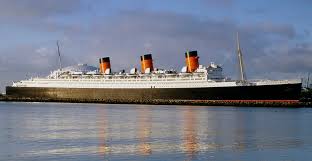The Weekly Reflektion 39/2025
People in any organisation appreciate that the management takes time to visit them in their workplace. An opportunity to talk about challenges and areas for improvement, including health and safety. An opportunity also, for the management and people to get to know each other. Many managers dominate the conversation and happily tell stories that are a mix of entertainment and a poorly disguised attempt to tell people to work harder. Listening is not a high priority, after all there is already not enough time in the day to do everything that needs to be done. Why add to the burden with new problems? The opportunity is squandered.

Why do you talk to people in your organisation?
RMS Queen Mary was built at the John Brown & Company shipyard at Clydebank near Glasgow. She was 80,774 gross register tons (GRT), making her the world’s largest passenger ship. She was launched on 26 September 1934 when eighteen drag chains slowed the ship down the slipway into the River Clyde. Following the launch the ship was fitted out with 24 Yarrow boilers in four boiler rooms and four Parsons turbines that powered her four propellers and gave her a maximum speed of 32 knots (59 km/hr). The ship had been ordered by the shipping line Cunard and work had been halted in 1931 due to the Great Depression. The UK Government granted a loan to ensure the ship was completed. The Queen Mary had her maiden voyage on 27 May 1936, and won the Blue Riband, the fastest trans-Atlantic crossing, in August of that year. Apart from 1937, she held this record until 1952. The Queen Mary is now permanently moored in Long Beach, California, and maintained by the Queen Mary Heritage Foundation. A lasting tribute to the Clydeside shipbuilding industry.
William Warrick was one of Cunard’s most famous captains and a charismatic figure. With his rugged looks and impressive beard, he could easily have been chosen to play the role of skipper in a Hollywood movie. He was captain on the Queen Mary from 1937 and any of the 1800 passengers lucky enough to get a seat at the captain’s table were entertained with stories and anecdotes from his long, seemingly endless, experience at sea. Warrick was also knowledgeable about the ship’s construction and engine design and could educate the passengers on the fantastic engineering feat that this ship was. Warrick would, however, always remind his passengers of one of the most important of Cunards’ rules for the captain of any vessel in the fleet, introduced in 1847.
‘Keep yourselves always kind and civil to your passengers. Recollect they will value your services on deck, looking after their safety, more than talking to them in the saloons’.
Maybe if the management in Occidental had been ‘looking after their safety’ and listening to the concerns from the people on board Piper Alpha, the tragic disaster on 6th July 1988 and the loss of 167 lives would have been avoided. The Cullen Inquiry, that investigated the disaster, concluded that management failed to foster a safety culture where workers felt empowered to halt unsafe work.So next time when you are speaking to your people and you are just getting into the flow of a great story, stop and consider asking how you can help. Listen and act.
